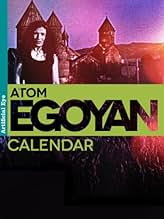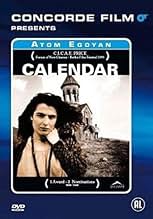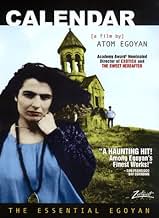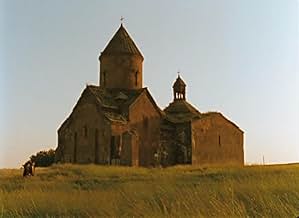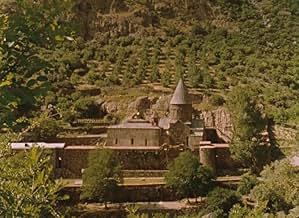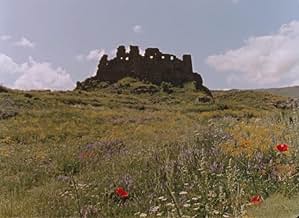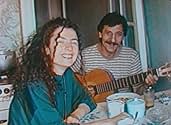AVALIAÇÃO DA IMDb
6,7/10
2,5 mil
SUA AVALIAÇÃO
Adicionar um enredo no seu idiomaA woman stays in Armenia after her photographer husband completes his assignment and returns home to Canada.A woman stays in Armenia after her photographer husband completes his assignment and returns home to Canada.A woman stays in Armenia after her photographer husband completes his assignment and returns home to Canada.
- Prêmios
- 1 vitória e 2 indicações no total
Avaliações em destaque
Atom Egoyan's been very consistent in his career about two things. He likes messing with time frames, and his movies can come across as distant bordering on pretentious. Over the years he's been perfecting the former, and making improvements on the latter, as evidenced in Exotica, and, especially, in the beautiful, devastating The Sweet Hereafter.
Calendar came before those films, and it is even more experimental than they are. It would feel pretentious if it wasn't for the fact that Egoyan (more or less playing himself) portrays himself in a very unflattering light. But the whole enterprise does have that familiar Egoyan chill. He plays a photographer who is taking pictures of old Armenian churches for a calendar.
In what is perhaps an expression of self-doubt regarding his aesthetic instincts, his character seeks only to capture the superficial beauty of the churches, paying little attention to the history behind them. He is on this trip with his wife (played by Egoyan's wife), and both of them are of Armenian origin. In Calendar, Egoyan could be trying to comment on any number of things, about his relationship to his wife, to his roots, and to his art. At times it seems like you can almost discern a message coming through, and the film does become somewhat intriguing, but in the end the director is simply too subtle for his own good. And thus he keeps his audience at arm's length.
The shots of churches, though, are beautiful enough to make one want to visit Armenia.
Calendar came before those films, and it is even more experimental than they are. It would feel pretentious if it wasn't for the fact that Egoyan (more or less playing himself) portrays himself in a very unflattering light. But the whole enterprise does have that familiar Egoyan chill. He plays a photographer who is taking pictures of old Armenian churches for a calendar.
In what is perhaps an expression of self-doubt regarding his aesthetic instincts, his character seeks only to capture the superficial beauty of the churches, paying little attention to the history behind them. He is on this trip with his wife (played by Egoyan's wife), and both of them are of Armenian origin. In Calendar, Egoyan could be trying to comment on any number of things, about his relationship to his wife, to his roots, and to his art. At times it seems like you can almost discern a message coming through, and the film does become somewhat intriguing, but in the end the director is simply too subtle for his own good. And thus he keeps his audience at arm's length.
The shots of churches, though, are beautiful enough to make one want to visit Armenia.
'Calendar' is a slightly unusual film offering, written, filmed, directed, performed and possibly even fixed together with Scotch tape by Atom Egoyan, with this being my first trip into his cinematic world. It is a film that builds subtly, almost voyeuristically, so that the viewer finds themselves delving into the lives of its subjects to a level of prolonged discomfort, which reaches its crescendo as their true nature unfolds, all the while within some wonderful Armenian landscapes.
The plot concerns a Canadian-Armenian photographer returned to the land of his ancestors with the job of photographing his homeland's most picturesque churches for a forthcoming calendar. He is accompanied by his Armenian wife, acting as translator for the local driver and guide they have hired to provide them with background information on all the sites visited. The unassuming beginning suggests that this is more or less the sum-total of the film, but with every new location, we slowly learn of the deeply fragmented relationship present between the married couple and the cause of the ensuing distance between them. The way in which the film is shot helps to underscore this gulf, with the photographer never seen with his wife in the same place at the same time. Indeed, we only see him some time after the calendar has been printed, while we only see her during the photoshoot, very tellingly only in the company of the driver.
In some ways, 'Calendar' is rather difficult to watch, with the characters becoming more and more grotesque as the narrative progresses, especially that of the photographer, whose mounting jealousy (which could itself be described as a grotesque emotion) is exacerbated further by his unpleasant personality, particularly evident throughout scenes occurring in the present where, still emotionally in orbit around his estranged wife, he 'auditions' a long line of potential replacements (something that is not explicitly stated, so other viewers may have a different interpretation). Yet the film is shot in a very simple and effective way, which captures the claustrophobic mood of the piece while highlighting the wonderful natural backdrop. The camera is locked off in every scene, perhaps to mimic the still photography of the calendar itself, forcing the viewer to pay close attention to the tense and unspoken decay of the relationship. The still frame, accompanied by the subjects frequently in mid to long shot, further symbolize the distance felt by the man behind the camera and only serve to heighten his sense of isolation. These sequences are intercut with handicam footage of the characters' journey through Armenia, and yet despite providing the opportunity for motion, it is no more comforting, with the bluish tint and frequent lack of sound simply another form of isolation.
Egoyan is clearly a skilled photographer, and he lovingly captures the churches with the warmth and texture you would expect to see on a professional calendar. This only serves to heighten the contrasting coldness and unease created by the characters themselves, which Egoyan as the photographer and Arsinee Khanjian as the wife expertly create. It's certainly not a pleasant cinematic adventure, but anyone who has experienced that phase of a relationship will at least know the horrible awkwardness created between two people who were once close, and the helpless feeling of loss as a result. Unfortunately, drawn as he is, it is well-nigh impossible to sympathize with the protagonist's predicament, though his wife is by no means a victim.
The deeply personal discomfort, while real, does perhaps ensure 'Calendar' is probably not something I could sit through too often, but the effective minimalist approach on the production side and the jarring juxtaposition of cold, reserved knife-edge drama against the ultimately inconsequential polychromatic background has imbued a strong sense of the Atom Egoyan style. Certainly not a crowd-pleaser, but a director guaranteed to provoke thought. I'm certainly curious enough to explore some of his back catalogue some day. Actual rating 6 1/2 stars.
The plot concerns a Canadian-Armenian photographer returned to the land of his ancestors with the job of photographing his homeland's most picturesque churches for a forthcoming calendar. He is accompanied by his Armenian wife, acting as translator for the local driver and guide they have hired to provide them with background information on all the sites visited. The unassuming beginning suggests that this is more or less the sum-total of the film, but with every new location, we slowly learn of the deeply fragmented relationship present between the married couple and the cause of the ensuing distance between them. The way in which the film is shot helps to underscore this gulf, with the photographer never seen with his wife in the same place at the same time. Indeed, we only see him some time after the calendar has been printed, while we only see her during the photoshoot, very tellingly only in the company of the driver.
In some ways, 'Calendar' is rather difficult to watch, with the characters becoming more and more grotesque as the narrative progresses, especially that of the photographer, whose mounting jealousy (which could itself be described as a grotesque emotion) is exacerbated further by his unpleasant personality, particularly evident throughout scenes occurring in the present where, still emotionally in orbit around his estranged wife, he 'auditions' a long line of potential replacements (something that is not explicitly stated, so other viewers may have a different interpretation). Yet the film is shot in a very simple and effective way, which captures the claustrophobic mood of the piece while highlighting the wonderful natural backdrop. The camera is locked off in every scene, perhaps to mimic the still photography of the calendar itself, forcing the viewer to pay close attention to the tense and unspoken decay of the relationship. The still frame, accompanied by the subjects frequently in mid to long shot, further symbolize the distance felt by the man behind the camera and only serve to heighten his sense of isolation. These sequences are intercut with handicam footage of the characters' journey through Armenia, and yet despite providing the opportunity for motion, it is no more comforting, with the bluish tint and frequent lack of sound simply another form of isolation.
Egoyan is clearly a skilled photographer, and he lovingly captures the churches with the warmth and texture you would expect to see on a professional calendar. This only serves to heighten the contrasting coldness and unease created by the characters themselves, which Egoyan as the photographer and Arsinee Khanjian as the wife expertly create. It's certainly not a pleasant cinematic adventure, but anyone who has experienced that phase of a relationship will at least know the horrible awkwardness created between two people who were once close, and the helpless feeling of loss as a result. Unfortunately, drawn as he is, it is well-nigh impossible to sympathize with the protagonist's predicament, though his wife is by no means a victim.
The deeply personal discomfort, while real, does perhaps ensure 'Calendar' is probably not something I could sit through too often, but the effective minimalist approach on the production side and the jarring juxtaposition of cold, reserved knife-edge drama against the ultimately inconsequential polychromatic background has imbued a strong sense of the Atom Egoyan style. Certainly not a crowd-pleaser, but a director guaranteed to provoke thought. I'm certainly curious enough to explore some of his back catalogue some day. Actual rating 6 1/2 stars.
10Stu-24
Atom Egoyan's work is almost always about a distance from the immmediate events occurring. This film is no exception to this rule, but is heartbreakingly more accute in its treatment of the theme. Unlike the more popular films, there is no sympathy for the supposed main character, played by Atom himself. He is a dispicable, soul-less chap, without hope or redemption, lost in a fate of repetition that is of his own creation. Moreso than Egoyan's other films, this repetition is a fantasy, moreso than compulsion. Here guilt is as much at play as destiny.
This film hurts me.
This film hurts me.
Questions of diasporic national identity are brilliantly addressed in the concept of a modern society, through various media, paralleled to more personal and private issues such as jealousy, stubbornness and personal pride. Only a person with very little life experience could not comprehend anything to what is going on in this movie. Atom Egoyan succeeded in making a very universal film that is touching at more than only one level. With this film, he proves that he is more than a good film director, but truly an artist who is able to transpose a world view through simple a medium, with low budget. This is personally my favorite Egoyan film, though it's by no means the longest or most commercially successful.
A small project wedged between his first two more mainstream products, The Adjuster and Exotica, Calendar stars the director and his wife, Arsinée Khanjian as a photographer and his wife. They are traveling to different Armenian churches in order to photograph them for a calendar. Both of them are Armenian by heritage, but he is disconnected from it, while she speaks the language (and acts as translator). During the trip, their Armenian guide begins to grow closer to the wife. The film actually takes place much later, as Egoyan, now no longer with his wife, is trying to duplicate her by holding "auditions" with women, presumably re-enacting the first meeting with his ex. It's all rather confusing. I never quite figured it all out. I'm not sure the film works. I liked all the stuff about the Armenian churches (some beautiful images here, and the film's style in these scenes is great), but the whole narrative about the dates never seemed to come to fruition. However, it is an extremely interesting film, and it's rather haunting at the end. Calendar itself may feel somewhat incomplete, but Egoyan is definitely a fully-fledged artist here. The only earlier film of his I've seen, Speaking Parts, did not communicate his talent. This is definitely worth seeing, especially as it only runs at 75 minutes.
Você sabia?
- CuriosidadesThe film was mostly improvised, and made for barely $80,000.
- ConexõesEdited into 365 days, also known as a Year (2019)
- Trilhas sonorasBlue Feeling
Written and Arranged by John Grimaldi
Performed by Studebaker John and the Hawks
Principais escolhas
Faça login para avaliar e ver a lista de recomendações personalizadas
- How long is Calendar?Fornecido pela Alexa
Detalhes
- Data de lançamento
- Países de origem
- Idiomas
- Também conhecido como
- Calendar
- Locações de filme
- Empresas de produção
- Consulte mais créditos da empresa na IMDbPro
Bilheteria
- Orçamento
- CA$ 80.000 (estimativa)
- Tempo de duração
- 1 h 14 min(74 min)
- Cor
- Proporção
- 1.85 : 1
Contribua para esta página
Sugerir uma alteração ou adicionar conteúdo ausente

